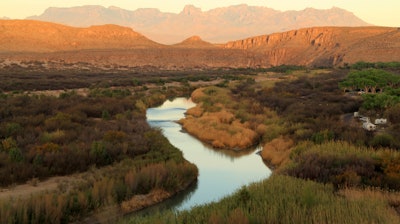
ALBUQUERQUE, N.M. (AP) — New Mexico, Texas and Colorado have negotiated a proposed settlement that they say will end a yearslong battle over management of one of the longest rivers in North America, but the federal government and two irrigation districts that depend on the Rio Grande are objecting.
New Mexico Attorney General Hector Balderas on Tuesday announced that the states had brokered a deal following months of negotiations. While the terms remain confidential, his office called it "a comprehensive resolution of all the claims in the case."
"Extreme drought and erratic climate events necessitate that states must work together to protect the Rio Grande, which is the lifeblood of our New Mexico farmers and communities," Balderas said in a statement. "And I'm very disappointed that the U.S. is exerting federal overreach and standing in the way of the states' historic water agreement."
Attorneys with the U.S. Department of Justice and irrigation districts that serve farmers downstream of Elephant Butte reservoir argued that the proposal would not be a workable solution. The river is managed through a system of federal dams and canals under provisions of a water-sharing agreement that also involves Mexico.
The case has been pending before the U.S. Supreme Court for nearly a decade. Texas has argued that groundwater pumping in southern New Mexico has reduced river flows, limiting how much water makes it across the border. New Mexico argues that it has been shorted on its share of the river.
New Mexico and the other states plan in the coming weeks to submit their motion to move the proposed settlement forward, opening the door for federal officials and the irrigation districts to respond.
Another hearing has been scheduled for January.
The battle over the Rio Grande has become a multimillion-dollar case in a region where water supplies are dwindling due to increased demand along with drought and warmer temperatures brought on by climate change.
So far, New Mexico has spent roughly $21 million on lawyers and scientists over the last nine years.
Last fall, the special master overseeing the case presided over the first phase of trial, which included testimony from farmers, hydrologists, irrigation managers and others. More technical testimony was expected to be part of the next phase, which has now been put off.
Earlier this year, some of the river's stretches in New Mexico marked record low flows, resulting in some farmers voluntarily fallowing fields to help the state meet downstream water-sharing obligations.
In the Elephant Butte Irrigation District, officials recently warned farmers that they can likely expect another late start to the irrigation season in 2023 and that allotments will be low again since the system depends less on summer rains and more on spring runoff from snowmelt in southern Colorado and northern New Mexico.






















